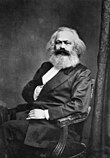
Back Transformasiya problemi Azerbaijani Transformationsproblem German Problema de la transformación Spanish Problème de la transformation French Problema della trasformazione dei valori in prezzi di produzione Italian Проблема трансформации Russian
This article has multiple issues. Please help improve it or discuss these issues on the talk page. (Learn how and when to remove these template messages)
|
| Part of a series on |
| Marxian economics |
|---|
 |
In 20th-century discussions of Karl Marx's economics, the transformation problem is the problem of finding a general rule by which to transform the "values" of commodities (based on their socially necessary labour content, according to his labour theory of value) into the "competitive prices" of the marketplace. This problem was first introduced by Marxist economist Conrad Schmidt[1] and later dealt with by Marx in chapter 9 of the draft of volume 3 of Capital. The essential difficulty was this: given that Marx derived profit, in the form of surplus value, from direct labour inputs, and that the ratio of direct labour input to capital input varied widely between commodities, how could he reconcile this with a tendency toward an average rate of profit on all capital invested among industries, if such a tendency (as predicted by Marx and Ricardo) exists?
- ^ Böhm-Bawerk, Eugen (1896). Karl Marx and the Close of his System. ISBN 978-1466347687.
© MMXXIII Rich X Search. We shall prevail. All rights reserved. Rich X Search